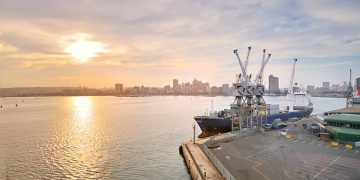Transnet National Ports Authority (TNPA) and Mnambithi Liquid Bulk Terminals have signed a terminal operation agreement for a new R1.1 billion liquid bulk terminal at the Port of Durban.
At the signing ceremony and sod-turning event, Transnet chief executive Michelle Phillips expressed pride in partnering with Mnambithi, a 100% black-owned company. She noted that the project’s environmental impact assessment was approved two years ago, facilitating the agreement signing. “We are very proud to have a 100% black-owned company operating in the port and officially partnering with Transnet. It has been a very ambitious project, but also very much attainable,” Phillips said.
Phillips highlighted the importance of empowering black-owned enterprises and encouraging their participation in the sector. “This is how we will continue in the future to remove barriers and transform the industry. It has been a journey, not easy, but worth it. As we move forward with the lessons learned, we need to compress the timelines to allow access to our business and industry,” she added.
TNPA chairperson, Tshokolo Nchocho, described the project as a “most significant and transformative” investment in the port system and the country. “This project between Mnambithi and TNPA is a remarkable achievement that demonstrates what can be accomplished when the government and private sector cooperate,” Nchocho said.
He noted that TNPA and Mnambithi’s management engaged in intense planning and development over the past 2.5 years, culminating in the terminal operation agreement. “We look forward to this substantive transformation initiative in the liquid bulk industry in this region and in South Africa as a whole,” Nchocho stated.
Mnambithi chairman, Vusi Mazibuko, mentioned that the project had taken ten years of negotiation with Transnet, from concept to the operating agreement signing. “Building a state-of-the-art terminal and assembling the operating team is another challenge, but we hope to get all partners and stakeholders on board to make this journey a success,” he said.
The terminal will have the capacity to store 100,000 cubic meters of liquid bulk cargo, including edible oils, caustic soda, and phosphoric acid. Approximately 1,000 jobs are expected to be created during construction, which will be completed in one phase, and over 200 jobs will be created once the terminal is operational. Construction is anticipated to start in the next three months, with completion expected around mid to late 2026.
Find the latest supply chain report news at The Supply Chain Report. For international trade tools, see ADAMftd.com.
#SupplyChainNews #Logistics #PortInfrastructureNews #BulkTerminal #DurbanPortNews















